Coordinación
Una coordinación sólida puede evitar vacíos y duplicaciones en las respuestas humanitarias, así como garantizar que los PTM complementen otros tipos de asistencia. Sin embargo, el informe del «Estado Global de los Programas de Transferencias Monetarias» de la CALP Network muestra que la coordinación de la asistencia en efectivo es vista como débil y ad hoc, y que esto está teniendo graves repercusiones operativas.
Los donantes, las ONG y los líderes de los grupos de trabajo de transferencias monetarias (GTM) han pedido claridad sobre tres temas principales relacionados con la coordinación de la asistencia en efectivo:
- Quién debe ser responsable de asegurar una coordinación eficaz de la asistencia en efectivo;
- Cuál es la función y el mandato de los grupos de trabajo de transferencias monetarias, incluso en relación con las transferencias monetarias multipropósito;
- Cómo se debe dotar de recursos a la coordinación de asistencia en efectivo.
Tenemos que basarnos urgentemente en lo que funciona y proporcionar claridad a nivel mundial sobre las preguntas arriba mencionadas, adaptándonos a los diferentes contextos. Hace mucho tiempo que se deberían haber tomado decisiones claras basadas en necesidades operativas y no en la política de las agencias.
Prioridades actuales
El objetivo de la CALP Network es contribuir a seguir progresando en este tema en tres niveles: apoyar a los grupos de trabajo de transferencias monetarias a nivel regional; contribuir a soluciones prácticas para la coordinación de la asistencia en efectivo a nivel mundial; y convocar una discusión basada en la evidencia sobre temas clave, destacando puntos de decisión críticos y oportunidades de progreso.
Contenido destacado

Cash Coordination Tip Sheet
Guidelines and Tools
This tip sheet sets out established best practice, key guidance and resources for all aspects of cash coordination, intended as a clear, accessible and action-oriented guide for those engaged in coordination of cash and voucher assistance (CVA) at the field level.

Introducing the Cash Coordination Tip Sheet
Webinar
The CALP Network has developed a tipsheet setting out established best practice and key guidance and resources for all aspects of cash coordination, intended as a clear, accessible and action-oriented guide for those engaged in coordination of cash and voucher assistance at the field level.

Cash Coordination: A proposal from members in MENA
Blog Post
Earlier this year the CALP Network undertook regional consultations to explore options for cash coordination. This blog lays out recommendations from participants from the Middle East and North Africa who sketched out what cash coordination, and coordination more broadly, could look like in future to support a more effective, efficient and accountable response.
Últimos recursos

Market Based Programming (MBP)
Guidelines and Tools
Market Based Programming (MBP) in Oxfam’s work means we always consider existing markets – through assessments, analysis and programming – across all phases of a response and across all technical sectors. You can also watch the videos below which are available in English, Spanish, Arabic and...

Podcast: Is informed consent possible in humanitarian CVA?
Podcast
Episode 2 of the CashCast tackles data responsibility with Amos Doornbos, Linda Raftree, James Eaton Lee and Ric Tighe

Mitigating Risks of Abuse of Power in Cash Assistance in Uganda
Report
This document outlines lessons learned from a joint UNHCR/WFP project in Uganda with the aim to identify and mitigate the risks of abuse of power in cash assistance through the main delivery mechanisms used in-country: mobile money, e-cards and cash delivered through mobile vans.
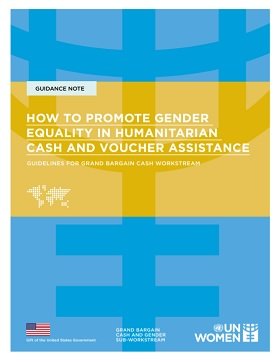
How to Promote Gender Equality in Humanitarian Cash and Voucher Assistance
Guidelines and Tools
The use of cash and voucher assistance (CVA) in humanitarian action is increasing rapidly.
With this rise, there is also growing demand by stakeholders to ensure CVA is more gender-responsive, addressing gender gaps and moving towards greater gender equality.
Gender-responsive CVA, which recognizes...
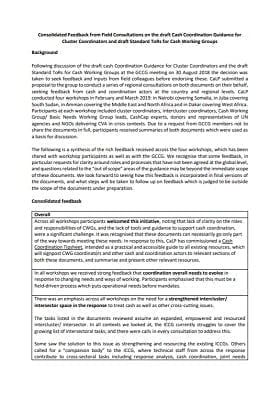
Consolidated Feedback from Field Consultations on the draft Cash Coordination Guidance for Cluster Coordinators and draft Standard ToRs for Cash Working Groups
Guidelines and Tools
Following discussion of the draft cash Coordination Guidance for Cluster Coordinators and the draft Standard ToRs for Cash Working Groups at the GCCG meeting on 30 August 2018 the decision was taken to seek feedback and inputs from field colleagues before endorsing these. The CALP Network submitted a...
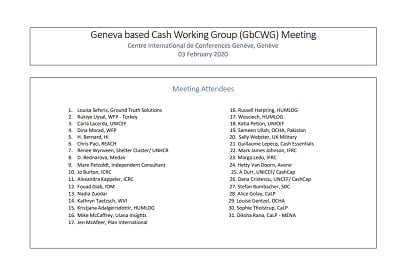
Geneva based Cash Working Group (GbCWG) Meeting – February 2020
Report
Geneva based Cash Working Group (GbCWG) Meeting

Compte-rendu du Cash Working Group du Mali du 27 février 2020
Report

Core CVA Skills for Supply Chain, Finance and ICT Staff
Curso
The Fritz Institute in collaboration with IRC, have produced modules based on the content of the 5-day face-to-face training for the Core CVA Skills for Supply Chain, Finance & ICT Staff course.

Introduction to Market Analysis
Curso
This 30 minute online course provides an introduction to the analysis of markets in emergency contexts, with input from some of the world’s leading thinkers on the topic.

A Practical Guide to Market Analysis in Humanitarian response
Curso
A three to four hour online course designed to provide future humanitarian market assessment team members with a solid understanding of theory and steps of market assessments so that they can join assessment teams prepared with a basic understanding of what they will be doing and why.

The Remote Cash Course
Curso
This course is for any humanitarian staff who may be involved in delivering cash remotely. It is designed for partner and field staff in hard to reach areas where sticking to normal best practice is impossible.

Practical Scenario: Monitoring and Adapting Cash and Voucher Assistance
Curso
This scenario based course takes around 2 hours to complete and allows learners to practice using their Cash and Voucher Assistance (CVA) knowledge and skills in a programmatic setting.

Practical Scenario: Coordinating multi-sector Cash and Voucher Assistance
Curso
This scenario based course takes around 2 hours to complete and allows learners to practice using their Cash and Voucher Assistance (CVA) knowledge and skills in a programmatic setting.

A guide to Cash and Voucher Assistance at Humanitarian Networks and Partnership Week
Blog Post
Don’t miss any of the sessions on cash and voucher assistance during the Humanitarian Networks and Partnership Week, which takes place in Geneva from 3 to 7 February 2020. On Monday 3 February, dive into the week with a session from the CALP Network on the Future of Financial Assistance: Supporting...
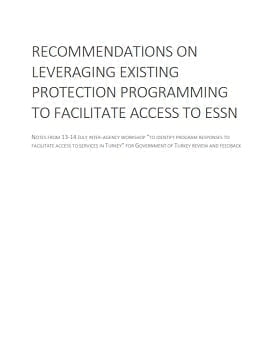
Recommendations on Leveraging Existing Protection Programming to Facilitate Access to ESSN
Report
At the request of the Inter Sector Working Group in Gaziantep and the Protection Working Group, the Cash-Based Interventions Technical Working Group (CBI TWG) produced an analysis of the need for cash-based interventions for people living under temporary protection (TP) or international protection (IP) in...
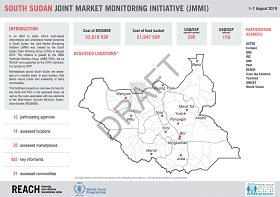
South Sudan Joint Market Monitoring Initiative (JMMI)
Report
In an effort to better inform cash-based interventions and understand market dynamics in South Sudan, the Joint Market Monitoring Initiative (JMMI) was created by the South Sudan Cash Working Group (CWG) in August 2019. The initiative is guided by the JMMI Technical Working Group (JMMI-TWG), led by REACH...
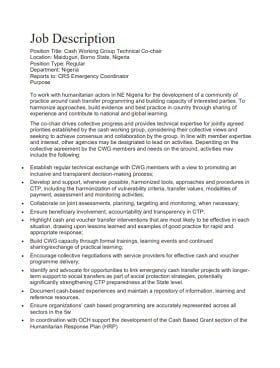
Nigeria CWG technical coordinator job description
Guidelines and Tools
Nigeria CWG technical coordinator job description
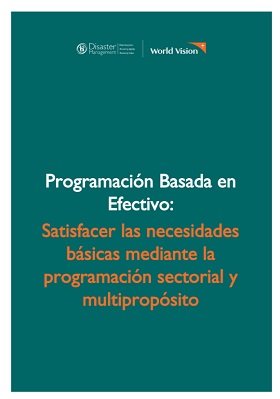
Programación Basada en Efectivo: Satisfacer las necesidades básicas mediante la programación sectorial y multipropósito
Guía y herramientas
World Vision usa el término Programación en Efectivo y Cupones (CBP) cuando se refiere a todos los programas donde el efectivo o los cupones (para bienes o servicios) se entregan directamente a individuos, hogares o beneficiarios comunitarios (no a gobiernos u otros actores estatales) para permitirles...
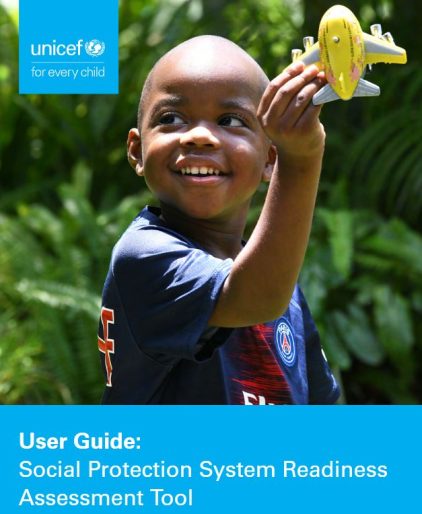
Social Protection System Readiness Assessment Tool and User Guide
Guidelines and Tools
The tool is designed for use in countries with some form of social transfer programmes, and a medium to high risk of disasters (refer to the webinar for more details). It aims to:
i. Assess the political, technical, operational and financial feasibility, or ‘readiness’, of the country’s cash-based...
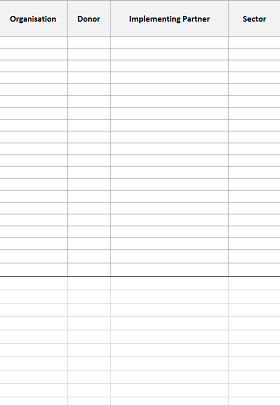
Iraq Cash Working Group (CWG) Partner Projects Registry
Guidelines and Tools
Spreadsheet template to track all the partner projects of a Cash Working Group